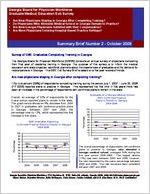Georgia Board for Physician Workforce Graduate Medical Education Exit Survey
Are New Physicians Staying in Georgia After Completing Training? Do Physicians Who Attended Medical School in Georgia Remain to Practice? Are New Georgia Physicians Satisfied with their Compensation? Are More Physicians Entering Hospital-Based Practice Settings?
Summary Brief Number 2 - October 2009
Survey of GME Graduates Completing Training in Georgia
The Georgia Board for Physician Workforce (GBPW) conducts an annual survey of physicians completing their final year of residency training in Georgia. The purpose of this survey is to inform the medical education and state physician workforce planners about the experiences of graduates and the demand for new physicians in Georgia. This GME Exit Survey Brief is based on a five year review of trends.
Are new physicians staying in Georgia after completing training?
Fifty nine percent (59%) of respondents completing training during the period July 1, 2007 June 30, 2008 (FY 2008) reported plans to practice in Georgia. This represented the first time in five years there has been an increase in the percentage of respondents with confirmed plans to remain in the state.
Percentage Percentage
Overall, an average of 52% of respondents for the 5-year period reported plans to remain in the state. The graph below shows an 8% decrease from 2004 to 2007 in graduates with confirmed practice plans in Georgia. Between 2007 and 2008, the percentage rose by 13%, which represented the first increase in five years.
GME Graduates Reporting Confirmed Practice Plans to Remain in Georgia
2004-2008
100
90
80
70
60 50
54%
50%
40
30
20
10
0
2004 2005
50% 2006
46% 2007
59% 2008
Graduates of a Georgia Medical School With Confirmed Practice
Plans to Remain in Georgia 2004-2008
100 90 80 70 60 50 38% 40 30 20 10 0
2004
27% 2005
38% 2006
32% 2007
34% 2008
The overall percentage of respondents with confirmed plans to practice in Georgia, who attended a Georgia medical school, averaged 34% during the five year period 2004-2008. The largest decline (11%) was seen between 2004 and 2005; however, the rate rebounded by the same percentage between 2005 and 2006. The rate remained fairly consistent between 2007 and 2008.
Georgia Board for Physician Workforce 1718 Peachtree St., N.W., Suite 683, Atlanta, Georgia 30309, (404) 206-5420 www.gbpw.georgia.gov Cherri Tucker, Executive Director, Kelly McNamara, Carla Graves, Colette Caldwell, and G.E. Alan Dever, M.D., Ph.D. contributors.
GME Exit Survey: Summary Brief Number 2
Page 2
Are New Physicians Satisfied with their Compensation Packages?
Respondents continue to be satisfied with their compensation packages. Since 2004, graduates with confirmed practice plans have continued to report a high level of satisfaction with compensation (averaging 95% of respondents indicating they were very satisfied or somewhat satisfied with compensation). There has been an overall downward trend within the last five years, though the percentages remain high. In terms of compensation packages, more respondents reported receiving salary with incentives versus salary without incentives. After a three year decline, the percentage of compensation packages with incentives began to increase from 50% in 2006 to 62% in 2008.
Percentage of GME Respondents Who Are Very Satisfied or Somewhat Satisfied with Their Compensation Packages 2004-2008
100 96%
97%
94%
95%
94%
80
60
40
20
0 2004
2005
2006
2007
2008
Percentage
GME Graduates Reporting Compensation Packages With Incentives vs. Without Incentives 2004-2008
100 90 80 70 62% 60 50 40 30 23% 20 10 0
2004
57% 30%
2005
50% 33%
2006
57% 29%
2007
62% 28% 2008
With Incentives
Without Incentives
Percentage
Are More GME Graduates Entering Hospital-Based Settings?
The Primary Practice Setting that saw the largest increase among graduates (respondents) with confirmed plans was hospital-based practice. As displayed in the chart to the right, there was a 14% overall increase from 2004 to 2008. Although a 5% decrease in GME graduates entering hospital-based practice was reported between 2006 and 2007, the percentage rebounded between 2007 and 2008 (increasing from 22% in 2007 to 36% in 2008).
Percentage
GME Graduates with Confirmed Practice Plans in a Hospital-Based Setting 2004-2008
100
90
80
70
60
50
40 30
22%
20
10
0
2004
22% 2005
27% 2006
22% 2007
36% 2008
The purpose of the Georgia Board for Physician Workforce is to address the physician workforce needs of Georgia communities through the support and development of medical education programs. In this role, the GBPW works closely with medical schools and teaching hospitals throughout the state. All direct state funding to support medical education, with the exception of money appropriated through the Board of Regents, is administered by the GBPW. The GBPW is also responsible for identifying areas of the state in which unmet priority needs exist for physicians by monitoring and evaluating the supply and distribution of physicians by specialty and geographical location.
Please visit the GBPW's website (www.gbpw.georgia.gov) for a copy of the full 2008 GME Exit Survey Report, as well as other useful publications related to Georgia's medical education system and the state's physician workforce.
